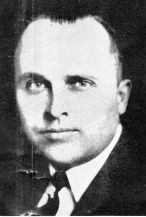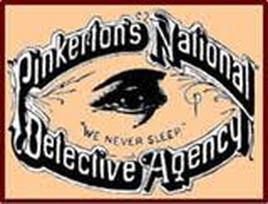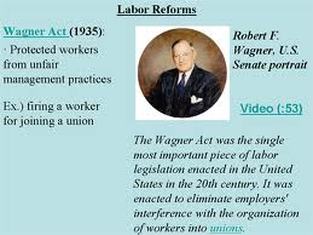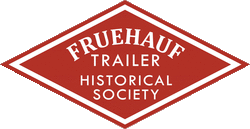HARVEY CHARLES FRUEHAUF - 1893-1968

Harvey Charles Fruehauf, Sr. was the second of five children born to August ‘Gus’ Charles Fruehauf (1867-1930) and Louisa Henrietta Schuchard (1870-1926). Harvey, born in 1893, excelled at financial and administrative planning, preferring to work in an office crunching numbers than in the trenches like his father. His belief in the usefulness of advertising was instrumental in making the family’s new ‘trailer contraption’ known to the world.
In 1920 Harvey married his life-long mate Angela Stewart Peck (1892-1980). They would go on to have two daughters and a son.
He became the natural choice to become the company’s new leader when August decided to retire in 1930 and died later that year.
Harvey ruled Fruehauf Trailer Company with an autocratic German style he inherited from August. He required a lot from his employees, and that included family members, expecting long hours despite the difficult and dangerous working conditions. He became openly resentful of the controls that the government imposed on business owners, to create better working conditions for his employees.
In the late 1930's, Harvey found himself pitted against the NLRB (National Labor Relations Board) as he goes to court over violations he has committed involving the Wagner Act. Jones & Laughlin Steel Corporation, Friedman-Harry Marks Clothing Company and Associated Press Company were also named in violation of the Wagner Act. By 1935, Fruehauf Trailer Company had become a major employer in the city of Detroit. In his efforts to keep his company union free, he violated every mandatory right given to his employees under the Wagner Act. Along with an assortment of other violations, Harvey is reprimanded for committing corporate espionage after hiring a Pinkerton detective as an undercover employee who infiltrated the union and brought its secrets back to Harvey’s desk. He lost the case, and continued to fight government and union control of the company for the remainder of his career.
In 1920 Harvey married his life-long mate Angela Stewart Peck (1892-1980). They would go on to have two daughters and a son.
He became the natural choice to become the company’s new leader when August decided to retire in 1930 and died later that year.
Harvey ruled Fruehauf Trailer Company with an autocratic German style he inherited from August. He required a lot from his employees, and that included family members, expecting long hours despite the difficult and dangerous working conditions. He became openly resentful of the controls that the government imposed on business owners, to create better working conditions for his employees.
In the late 1930's, Harvey found himself pitted against the NLRB (National Labor Relations Board) as he goes to court over violations he has committed involving the Wagner Act. Jones & Laughlin Steel Corporation, Friedman-Harry Marks Clothing Company and Associated Press Company were also named in violation of the Wagner Act. By 1935, Fruehauf Trailer Company had become a major employer in the city of Detroit. In his efforts to keep his company union free, he violated every mandatory right given to his employees under the Wagner Act. Along with an assortment of other violations, Harvey is reprimanded for committing corporate espionage after hiring a Pinkerton detective as an undercover employee who infiltrated the union and brought its secrets back to Harvey’s desk. He lost the case, and continued to fight government and union control of the company for the remainder of his career.
Fruehauf Trailer Company indicted for failure to comply with the Wagner Act
Over the next 12 years the company had a gradual increase in expansion and development riding the tide of the industrial boom. With the combined efforts of the three brothers, Fruehauf Trailer Company became an increasingly important business and an icon of the American Transportation industry.
In 1949, Harvey, 15 years Roy’s senior, eventually reached an age when he decided to retire from active participation, and passed on the reins of Fruehauf Trailer Company to the next generation.
Harvey would continue to serve as president of Fruehauf until April 1949 when he retired, taking on the role of board chairman. Over the course of his retirement, conflicts developed between the two brothers. Harvey became increasingly isolated from the remaining board and family members of the company. Finally, Harvey retired as board chair in 1953 citing his retirement due to “reasons of health,” and selling all his voting shares in Fruehauf stock to a non family member, severing all ties to Fruehauf Trailer Company. This action resulted in a bitter and protracted proxy battle for control of Fruehauf which resulted in serious and lasting consequences.
Harvey went on to become a founding investor in Burger King and a director of the paper giant Georgia-Pacific.
Harvey Fruehauf suffered a heart attack October 14, 1968. He is buried in Woodlawn Cemetery, Detroit, Michigan.
In 1949, Harvey, 15 years Roy’s senior, eventually reached an age when he decided to retire from active participation, and passed on the reins of Fruehauf Trailer Company to the next generation.
Harvey would continue to serve as president of Fruehauf until April 1949 when he retired, taking on the role of board chairman. Over the course of his retirement, conflicts developed between the two brothers. Harvey became increasingly isolated from the remaining board and family members of the company. Finally, Harvey retired as board chair in 1953 citing his retirement due to “reasons of health,” and selling all his voting shares in Fruehauf stock to a non family member, severing all ties to Fruehauf Trailer Company. This action resulted in a bitter and protracted proxy battle for control of Fruehauf which resulted in serious and lasting consequences.
Harvey went on to become a founding investor in Burger King and a director of the paper giant Georgia-Pacific.
Harvey Fruehauf suffered a heart attack October 14, 1968. He is buried in Woodlawn Cemetery, Detroit, Michigan.



